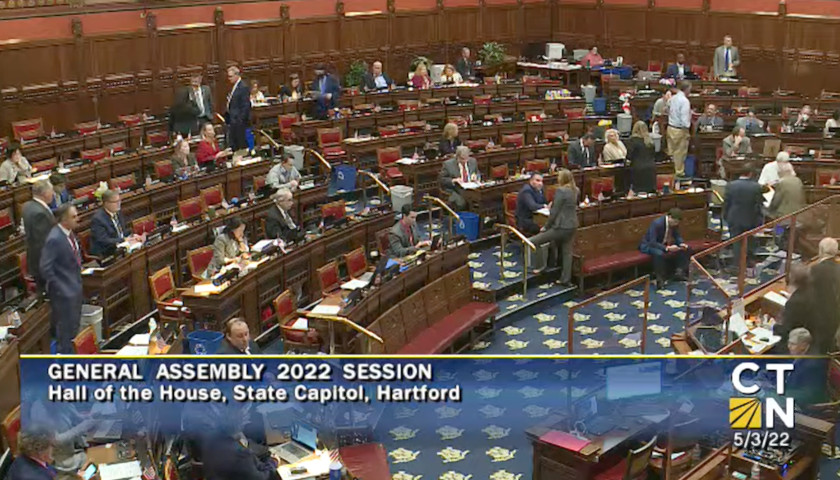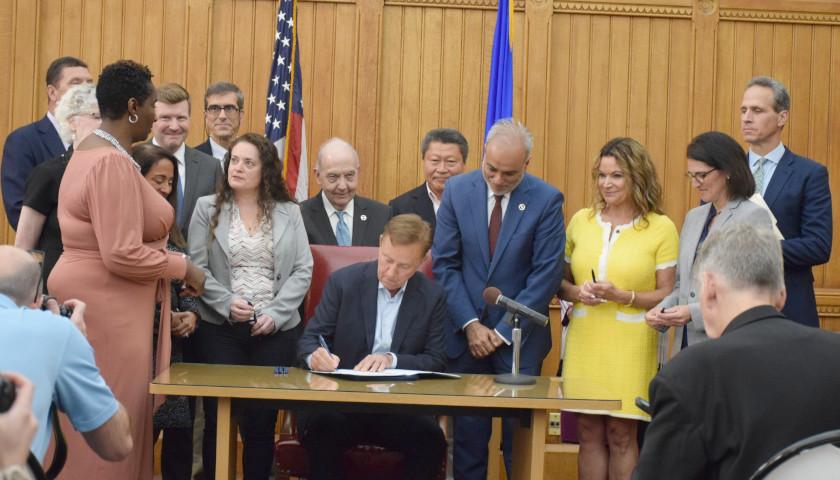By a vote of 95-53 on Tuesday, Connecticut’s State House of Representatives approved a 43 percent salary increase for state lawmakers and statewide elected officials.
It is the first such pay raise enacted since 2000. Representatives conducted no public hearings on it, having only fleetingly discussed potential adjustments to politicians’ compensation during committee meetings.
The measure would increase each legislator’s salary from $28,000 to $40,000 next year and, beginning in 2025, adjust pay upward biennially according to the Employment Cost Index.
The Constitution State’s governor, lieutenant governor, treasurer, secretary of state, attorney general and comptroller would also get pay hikes under the legislation. The governor’s salary — now at $150,000, though current Governor Ned Lamont (D) does not accept it — would be tied to the state Supreme Court’s chief justice’s pay which is currently $206,617. The other constitutional officers’ compensation would be tied to that of the state’s Superior Court judges.
On Monday, Lamont said he will sign the bill should both legislative chambers pass it.
The raise prevailed after 20 minutes of discussion during which no legislator spoke against it. State Representative Bob Godfrey (D-Danbury) initially remarked that inflation has rendered $28,000 at the time of the last pay hike equivalent to about $45,000 in current dollars. He and other backers of the legislation complained that fewer Nutmeggers of modest incomes now find themselves able to seek state offices that demand much time but pay relatively little.
Raise supporters furthermore characterized the General Assembly as a de facto near-full-time legislature, despite its nominal part-time status. The National Conference of State Legislatures (NCSL) categorizes Connecticut’s lawmaking body among 26 “gray” state legislatures, meaning members typically assert that they spend over two-thirds of their professional time on state business. According to the NCSL, the average member of a gray legislature received $41,110 in state salary last year.
“We’ve heard … members are leaving because they can’t afford to stay here because the pay is too low,” Godfrey said. “And you can talk about part-time legislatures until the cows come home; we’re not [one].”
State Rep. Doug Dubitsky (R-Chaplin) concurred with his Democratic colleague that circumstances warrant a substantial pay increase absent a measure to make Connecticut legislators’ jobs “truly part-time.” In the past, Dubitsky introduced a bill to that effect, decreasing the number of session days but also nixing benefit packages and aligning salaries with the reduced workload. He recalled his colleagues balking at that reform.
“That bill went over like a brick balloon,” he said. “So the question is: What do we do? We’ve got this system in place that is designed to limit the type of people who can do this job, and I think that’s wrong.”
Ken Girardin, director of policy and research at the Hartford-based Yankee Institute, objected to the pay-hike legislation, reasoning that while salary changes arguably deserve consideration, he believes the bill passed by the House got taken up too precipitously. He further regretted that lawmakers are embracing automatic biennial raises after no substantive debate on the subject.
“This was sprung on the Connecticut public with literally minutes notice,” he said. “No hearings, no outside testimony, no nothing. And that is not a good way to make policy.”
Girardin argued that legislators could have more defensibly proposed a substantial one-time pay increase while removing themselves from participation in the state pension and health systems that they oversee.
He concluded his reaction to the legislation by responding to a remark Dubitsky made that the payment system does not attract the “best and brightest” to state office.
“If there’s such concern about the quality of the people getting elected, I, for one, would like to hear from the lawmakers which lawmakers they think don’t belong in any of these offices,” Girardin said.
The vast majority of the House’s Democratic Caucus voted in favor of the bill, with only 11 members voting in the negative: Jill Barry (D-Glastonbury), Patrick Boyd (D-Brooklyn), Michael DiGiovancarlo (D-Waterbury), Jaime Foster (D-East Windsor), Jennifer Leeper (D-Fairfield), Liz Linehan (D-Cheshire), Ronald Napoli (D-Waterbury), John-Michael Parker (D-Durham), Kara Rochelle (D-Ansonia), Mary Welander (D-Orange), and Kerry Szeps Wood (D-Newington).
Eleven of the House’s 54 Republicans voted for the increase: Dubitsky, Tim Ackert (R-Columbia), Whit Betts (R-Bristol), Vincent Candelora (R-North Branford), Robin Green (R-Andover), David Labriola (R-Oxford), Brian Lanoue (R-Griswold), Ben McGorty (R-Shelton), Tom O’Dea (R-New Canaan), Tony Scott (R-Monroe), and David Wilson (R-Litchfield).
https://www.youtube.com/watch?v=32Oc9kRenU4
– – –
Bradley Vasoli is managing editor of The Connecticut Star. Follow Brad on Twitter at @BVasoli. Email tips to [email protected].





